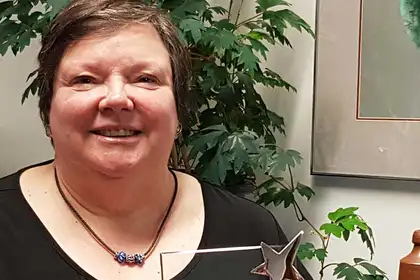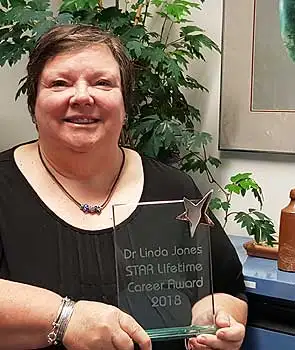
Health psychologist Dr Linda Jones, whose research on anxiety and stress among patients and dentists has been recognised internationally.
Health psychology lecturer Dr Linda Jones has been internationally acknowledged for an academic career of applied research addressing issues around anxiety and stress in the dental profession and among patients.
Dr Jones, from the School of Psychology at Massey University’s Wellington campus, is a recipient of the International Society for Stress and Anxiety Research Annual Lifetime Achievement Award, presented at the 39th annual STARS (Stress and Anxiety Research Society) conference in in Lublin, Poland.
Over the past two decades, she’s researched numerous dental topics, focusing on issues from childhood anxiety to practice management dynamics and suicide prevention among dentists. Other areas that have been the subject of her research include the prevalence of mouth guards worn by high school hockey players to the risks of mercury in amalgam fillings, and parents using smart phone apps to encourage their children to brush their teeth. She’s also written self-help books for dentists commissioned by the New Zealand Dental Association – one on taking care of their own mental health and another on communicating with patients.
‘Dental Jungle’ reduces kids’ anxiety
One of her greatest achievements has been addressing the teeth-related terrors of the young. Her computer game intervention, titled Dental Jungle, has helped reduce children’s anxiety about visiting the dentist through a 20-question survey a child completes in the waiting room, which tells the dentist what the child is feeling, what they fear and what would make a difference to them.
For the 15 per cent of New Zealand youngsters who suffer anxiety about dental appointments, the opportunity to communicate with the dentist before they get into the chair is game-changing, Dr Jones says. What made the difference for participants was handing over the completed survey to the dentist, so they know they are being heard – a mechanism called “perceived empathy”.
Dental Jungle started ten years ago after Dr Jones heard a Radio New Zealand Insight documentary, introduced with a reference to the dreaded “murder house” – as baby boomers called the school dental clinic thanks to the slow drill and lack of pain relief. She was struck by this in an age when dentistry is no longer the physically painful experience it once was. “I thought ‘there must be something I can do for the kids who are still hearing about the murder house, because dentistry has changed so much. We did have the slow drills but now have laser drills and anaesthetics.”
She received funding from the Ministry of Health and the Royal Society of New Zealand for the project, which involved two randomised trials involving more than 450 children in New Zealand and 50 in the UK. And she’s hoping to find a tech-savvy entrepreneur to design a smart phone app so it can used more widely.
Adults experience anxiety too, of course, and her study found that a pleasant waiting room, with plants, art, appealing furniture and seating arrangements are all; “things that change how we feel about being there”.
Suicide among dentists trending down
The wellbeing of dentists is another concern and a focus of her work. Her research published in 2016 reviewed occupationally-linked suicides among dentists in New Zealand and found that the rate is trending down relative to other health care professionals – despite the public perception that dentists have the highest suicide rate of any profession.
However, many dentists have told her hardly a day goes by without a patient saying they hate them. “Over a lifetime career it wears you away,” she says.
Suicide rates were the highest in the 1950s among male dentists who’d returned from the war and, she thinks, were most likely to have been suffering from Post-Traumatic Stress Disorder (PTSD). “The easy way to get relief was to hop in your chair at lunchtime and give yourself a bit of nitrous oxide, but an accidental overdose could be fatal. It can’t happen these days because dental gas is mixed with oxygen.”
Dr Jones’ book, co-written with dentist Dr Jeffrey Annan, also addresses issues of depression, stress and the need to seek help when things become too much.
Statistics are hard to clarify, but her research identified mental health risk factors for dentists such as burn-out, difficult patient relationships, social isolation, stress from worrying about equipment failure and tensions within dental team dynamics that can comprise a practice manager, receptionist, and dental therapist or nurse.

Dr Linda Jones with her STAR award.
Dental team dynamics dissected
Lack of staff support is a source of stress for dentists. After a series of focus groups to explore dentists’ daily hassles, Dr Jones found dental team dynamics emerged as an issue that could make or break a satisfying day at work. Dr Jones and her research colleague Dr Barbara Kennedy published a report on the findings in 2016.
“Specific issues around interpersonal relationships within the dental team became clearer when we ran a new study using semi-structured interviews and talked to 58 dentists, practice managers, dental assistants (DAs), hygienists, receptionists and support staff.
“The aim of the study was to examine both how team functioning could cause stress, negatively impacting wellbeing, and to identify factors that enhanced team functioning,” the authors wrote. To encourage open and honest responses, they used a motor vehicle metaphor as a coded way to get to the truth, asking participants: “if this practice was a car, what kind of car would it be?”
Across practises from North Auckland to Invercargill, responses included family car (Toyota), mid-sized Ford to a Lamborghini (high-end cosmetic dentistry) and even a truck or bus for big clinics. The researchers went on to ask dental practice staff; ‘who’s driving’, ‘has it got any dents or scratches and who attends to these?’ Dr Jones says that because participants didn’t have to talk about the practise directly, they didn’t feel they were telling tales on each other.
A lack of clarity about roles, processes and boundaries as well as communication breakdown and perceived unfair treatment all surfaced as issues that undermined the dental team dynamics and wellbeing of individuals in it. The researchers developed a toolbox or practice policy box to help navigate these issues, and recommended open communication as a core value.
Dental psychology as destiny?
Ironically, Dr Jones’ earliest memories include being minded by the dental nurse in the clinic at the Ramanui Primary School in the South Taranaki town of Hawera as a three-year-old in the 1950s while her mother worked there as a teacher. “There was no childcare in those days so I either sat on the mat with the other kids or went to the dental clinic and played with the cotton wool. There was something positive about dentistry – at least I didn’t detest it, and like many of my era, I had a mouth full of amalgam.”
Dr Jones completed her Bachelor of Arts (BA) degree at Massey majoring in sociology and psychology. For her first sociology assignment on asking people anything at all, she asked people how they felt about their teeth!
She then undertook her Honours degree at Victoria University investigating changes to the Dental Bill at the time, with a focus on the power arrangements and opening up free dentistry to older children. Before becoming the founding psychologist at Massey’s Wellington campus, she completed her masters on environmental psychology, trained as a teacher and taught for three years at Strathmore Park Primary School in Wellington.
The mercury question
Encouraged to study for a PhD, her controversial topic published in 2005 on the risks of mercury in amalgam fillings (titled The Quicksilver Quest: Two psychological studies investigating the effects of mercury in dentistry) put her offside with health officials for a while. She says one per cent of the population is sensitive to mercury in fillings and could develop memory problems and other health issues later in life. She also looked into the long-term health effects of dental nurses working in the 1950s and 60s (the peak period for amalgam fillings) and found they had higher rates of miscarriage and reproductive problems, including a 25 per cent chance of needing a hysterectomy compared with six per cent for other women.
“I’m not saying mercury isn’t safe for the majority of us who can excrete it effectively,” says Dr Jones. “But there are people who don’t [excrete it] and those people are ignored by the system. They’re told they’re hypochondriac, they’ve got psychosomatic conditions – some of them even consider suicide.”
Mercury is still used in the school dental service. “The problem is that kids with mercury fillings are kids in Northland and East Cape, because it’s cheaper. Kids in Karori and Remuera get white fillings.”
What’s more, she adds, Ministry of Health food safety rules say don’t eat more than three tins of tuna a week because of mercury, “but you can have it in your fillings – quite large amounts of it!”
Dr Jones says she takes pride in doing research that helps people. She’s presented nine dental topics at the STARS conference since 2001. “It’s quite important to me that I do something useful for people, and not just sit in my office and generate theories.”
She’s not interested in the cosmetic dentistry phenomenon (older well-off women having diamonds inserted into their canines). It’s the people who need, but can’t get dental care she is concerned about. “When people’s smiles are compromised, or they can’t chew food, or it might affect their speech, there’s a point where it will affect their ability to get a job – if they’re not going because they’re afraid or because of money, I’m more interested in them.”